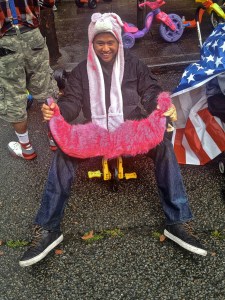
On Thursday, the Seattle City Council will decide whether to put a cap limit on the amount of transportation network ompanies that are currently roaming the city. Transportation Network Companies (TNCs for short) is the umbrella term for drivers and vehicles that are affiliated with rideshare companies such as UberX, Lyft and Sidecar Drivers.
Unlike taxi cabs and flat-rate for hire vehicles, TNC drivers use their own cars. UberX, Lyft and Sidecar use smartphone apps to connect ordinary car owners with those searching for a ride. Passengers can log-on with a TNC for a fee and make a connection with the nearest available driver. UberX, Lyft and Sidecar were all started by entrepreneurs from Silicon Valley and they’re heavily covered by on-line publications such as Geekwire.com. TNCs are becoming increasingly popular in major cities.
Currently, the city doesn’t know how many ride-share drivers are in Seattle; the Council’s looking to cap the amount of drivers and their vehicles at 300. Taxi drivers and for-hire drivers (who haven’t always been on the same side of every issue) say rideshare companies compete against them with fewer regulations. The TNCs respond that regulations would cause some of them to shut down. Currently, the city has 928 licensed taxi drivers and 200 more for-hires along with 1500 limo drivers who are regulated by the state but sometimes drive for TNCs.
The Seattle City Council has been wrestling with the problem for a year. The council even formed a separate committee to look into the problem; originally known as the Committee for Taxies, For Hires and Limousines, now called the TNC Committee. At its last meeting on Valentine’s Day, the Council voted on some major issues:
- Insurance — All drivers of commercial vehicles must have adequate insurance and with TNCs, the insurance “kicks in” as soon as they log in NOT when they pick up a passenger. On New Years’ Eve, a UberX driver ran over and killed a six-year-old girl in San Francisco. Her family is suing the driver and the company. UberX said its insurance doesn’t cover the driver because he didn’t have a passenger.
- Training — Drivers must take an exam which includes driver safety and consumer protection and some first-aid training. Drivers will also be subject to a comprehensive background check and all drivers must have a permit issued by the city.
- Safety — All cars must pass a safety inspection conducted by the city or a third party.
The city also reached a decision that for-hire drivers now have hailing rights. For-hires can now legally pick up pedestrians when they try to wave down a passing car. The council still hasn’t ruled on “deadheads.” This is a term for a driver who, for example, picks up a passenger in Seattle, takes the fare to a neighboring city, but is legally prevented from taking another paying customer back to Seattle.
At the Feb. 14 hearing, council member Sally Bagshaw said that she “scolded” the TNCs for not being more forthcoming with information on how many drivers they employ. However, Bagshaw says she’s against capping drivers since poor people and minorities would be most hurt by a cap. UberX did provide some information to the council member saying that 95% of their drivers are from East Africa, India and Pakistan. Lyft says 25 percent of its Seattle drivers are women.
Bagshaw and fellow council members Tom Rasmussen and Tim Burgess are against caps. The remaining six council members are leaning towards caps although Sally Clark, chair of the TNC Committee, and Jean Godden aren’t against a higher number like 600 caps. While the council doesn’t know how many TNCs are on the road, Bagshaw said she received a petition from UberX that had 600 signatures, meaning they must have even more drivers than that (some drivers work for more than one company).
Regardless of Thursday’s decision, TNCs are here to stay. Sidecar received $20 million as a start-up, two years ago. Two years ago, Lyft raised $83 million and UberX, $32 million from investors. Uber investors include Jeff Bezos and Goldman Sachs.
Thursday’s meeting will begin at 4 PM in the City Council chambers.
